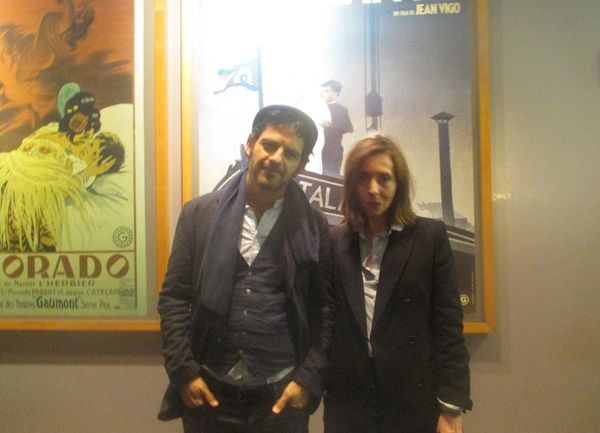 |
| Géza Röhrig with Anne-Katrin Titze at Lincoln Plaza Cinemas for the opening of Son of Saul (Saul fia), directed by László Nemes Photo: Aimee Morris |
Earlier this month, László Nemes introduced me to Géza Röhrig at a brunch in honour of Danny Boyle's Steve Jobs, written by Aaron Sorkin, starring Michael Fassbender, Kate Winslet, Seth Rogen and Jeff Daniels. We spoke about Claude Lanzmann, the unfortunate timing of Steven Spielberg's Schindler's List for Stanley Kubrick's The Aryan Papers, critiquing Quentin Tarantino's Inglourious Basterds and Roberto Benigni's Life Is Beautiful, Slavoj Žižek in The Pervert's Guide To Ideology on Robert Wise's The Sound Of Music and a whisper from Albert Camus to Elie Wiesel.
Géza explained why Robert De Niro or Jack Nicholson would not have had an advantage over him playing Saul Ausländer. The Mirroring Evil: Nazi Imagery/Recent Art exhibit in New York led us to the fact that every genocide is multigenerational and he shed some light on his family history.
_225.jpg) |
| Saul Ausländer (Géza Röhrig) |
Oscillating between the experience of being tied to Saul while he fulfills the physical duties of the Sonderkommando and the awareness of sitting in a warm, safe movie theatre, brings the audience to a place between there and not there - a good starting point for moral reckoning. Son Of Saul deals with the uncontainable.
Anne-Katrin Titze: When I spoke with László, he called you our guide. We, the audience, don't really want you as our guide at the start of the film. We are much too close to you for any kind of comfort. But there is no other way. This is such an important choice. Do you see your character as the audience's guide into hell?
Géza Röhrig: I think, just based on the conversations with László, what he recognises is that the enormity of the Holocaust, or any genocide for that matter, is so overwhelming that you cannot encompass it. The only way to show it is to reduce the scope. You can't talk about two, three, one hundred-thousand people, but you can maybe talk about one. That was the idea. Less is more. We preferred restraint over excess.
The subject matter, the weight it carries, meaning a state-sponsored full scale genocide in the heart of European civilisation, the attempt to erase an entire race from the face of the earth, is such an incomprehensible scandal on so many levels, that we felt that our job in this movie, is to passage the Holocaust.
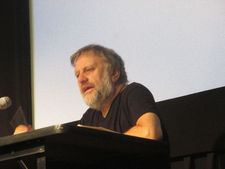 |
| Slavoj Žižek: Is Hegel Dead - Or Are We Dead in the Eyes of Hegel? Photo: Anne-Katrin Titze |
To bring back the Holocaust from the abstract to the concrete. We didn't want to be smart. We don't understand how this could have happened. We didn't want to interpret the event. What we wanted is to create an experience. Not from looking back from 2015, but to take the viewer as a companion and bring him into the here and now of 1944. The angle we found to do that is to take one day of one man. That's what felt to us was only humanly possible. That's why it is only one man.
AKT: And one day.
GR: And one day. See, the face is very important in this movie because that's where the world and the person meet. Whatever happens to you is written on your face. The challenge for me as an actor was that the face is an extremely sensitive surface. It's kind of like water. You don't have to touch water to cause a change, to stir the water. It's enough to blow on the water. The face is similarly an extremely nuanced and sensitive surface.
It has so many muscles around the eyes and the lips. So you get a camera 30 inches from one face and my job was to not be too revealing. Which is very hard to do with a closeup. I wanted to keep the character somewhat enigmatic so that we don't understand him. The reason simply, is because the situation the Sonderkommando members found themselves in, is so unspeakable. It's so out of our ordinary normative daily life. I think, when a person is facing absolute power...
AKT: Absolute power?
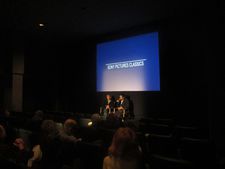 |
| Géza Röhrig with Anne-Katrin Titze on the approach to Son of Saul: "The only way to show it is to reduce the scope." Photo: Aimee Morris |
GR: Yes, absolute power, like Nazism, they don't just dominate you a bit, basically, they own you. When you face absolute power, the line of demarcation between life and death gets eradicated. There is an intermediate sphere of this mental misery. I don't think we can just know that from our own life. That's why people call Auschwitz a planet. It was a reality on its own.
I took on this role quite confidently, not simply because I thought I'm the right guy. But because the role is such, that I felt that the young Jack Nicholson or the young Robert De Niro would not have had any advantage over me. Because this is not a certain type of role, Saul's, that tricks, or routine or pre-existing formulas, can help you with. You have to create something out of nothing.
AKT: In 2002, the Jewish Museum in New York had an exhibition called Mirroring Evil. It was a show of young artists dealing with the Holocaust. It was quite controversial and there were protests. I was invited by Norman Kleeblatt to speak on a panel there in connection with the exhibit. I thought the exhibit was a good way to have important conversations.
In my talk, I brought up the real prisoner uniform that the museum has in their permanent collection. That striped fabric, is so much more powerful than the provocative art in the exhibit was. When you stepped into Saul's prison garb with the enormous mark on the back, how did it affect you?
GR: I did not see the Mirroring Evil, but the same kind of thing happened in Hungary. There are always young artists who want to relate. Sometimes, not always, there's some great art to it. Oftentimes, there's something kind of distasteful - things that shouldn't end up there. I understand that. Why I did not feel weird to put this uniform on, it's because the Holocaust, like I guess, every genocide for the people who are part of it, is a multigenerational, or I would say, trans-generational journey. In other words, I am personally, decades before the movie - since age 12 when my grandfather initiated me to the history of the family - I am traumatised.
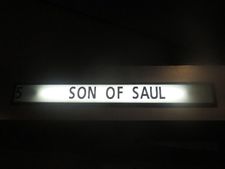 |
| Son Of Saul theatre light Photo: Anne-Katrin Titze |
AKT: At age 12, your grandfather told you of the family history?
GR: I'll tell you in a second. I am as a third generation from what happened, personally traumatised by an experience that I did not witness directly. Ask any psychotherapist, this is a commonplace when it comes to the Holocaust. I am sure some Armenians, or some Tutsis or whatever - other victims of genocides feel the same thing. I tell you why. When I was 12, I found in a shoe box a bunch of photos on the top shelf in a closet. And I could tell immediately that these photos - by the colouring which was brownish, silverish - that these photos are old photos, pre-war photos, perhaps, and I haven't seen them before. So I confronted my grandfather during a chess game, saying "who are these people?"
And I see the sea change on his face. He immediately put the pieces away from the chessboard and he told "That's my father, that's my mother, that's my younger brother, that's my older sister who was pregnant." And I said "Where are these people?" So at 12, I got to learn from this. From that time onwards, I understood that, obviously, my family wanted the best for me. What they thought, in a silly way, was, what you don't know, can't hurt you. But that's obviously a mistaken position because the psychic reality of the parents is always picked up by the children. There's a million non-verbal ways that children somehow sense it and grasp what happened. This is exactly the trauma I am talking about.
AKT: I completely agree - children take in what is hidden.
GR: There is a great anecdote Elie Wiesel told me, actually the day before yesterday, when he saw Son Of Saul. That Camus came up to him in Paris in the Sixties and he wasn't drunk and he wasn't joking. And Camus whispered into the ear of Elie Wiesel, "I envy you for Auschwitz." And I see why. Because it is really saying that if you were there and you didn't die in it, it is an experience of truth. It's an experience almost metaphysical.
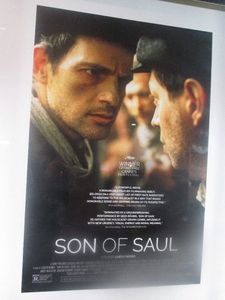 |
| Son Of Saul at Lincoln Plaza Cinemas in New York Photo: Anne-Katrin Titze |
I understand why a survivor could be envied for that. It's an encounter of something very very essential. What is food? What is air? What is breathing? What is love? A Holocaust survivor has a chance to know about things that's very hard to gather from other areas of life. So what I'm saying is, that making it through a genocide, as terrible as it is, creates in you such a deep emptiness that can serve as a vehicle for the divine to come in.
AKT: You think that is what Camus was saying?
GR: I think Camus was genuinely envying Elie Wiesel for all the right reasons for Auschwitz. He felt that that experience has something so specific and important that it's really hard in any other life to gather.
Son Of Saul, Hungary's Oscar submission, has been selected as one of the nine Best Foreign Language Film candidates shortlisted by the Academy of Motion Picture Arts and Sciences.
Coming up: Slavoj Žižek, Roberto Benigni's Life Is Beautiful, Steven Spielberg's Schindler's List impacting Stanley Kubrick's The Aryan Papers and what Quentin Tarantino's Inglourious Basterds has in common with The Sound Of Music. The profound impact of a visit to Auschwitz at age 17, the fragility of civilization, the danger of big questions with small answers, Disney-fication versus finding a new grammar, Theodor Adorno, and how the Sonderkommando has turned into software.
Son Of Saul premiered in New York on December 18 and is scheduled for release in the UK on April 1, 2016.





















